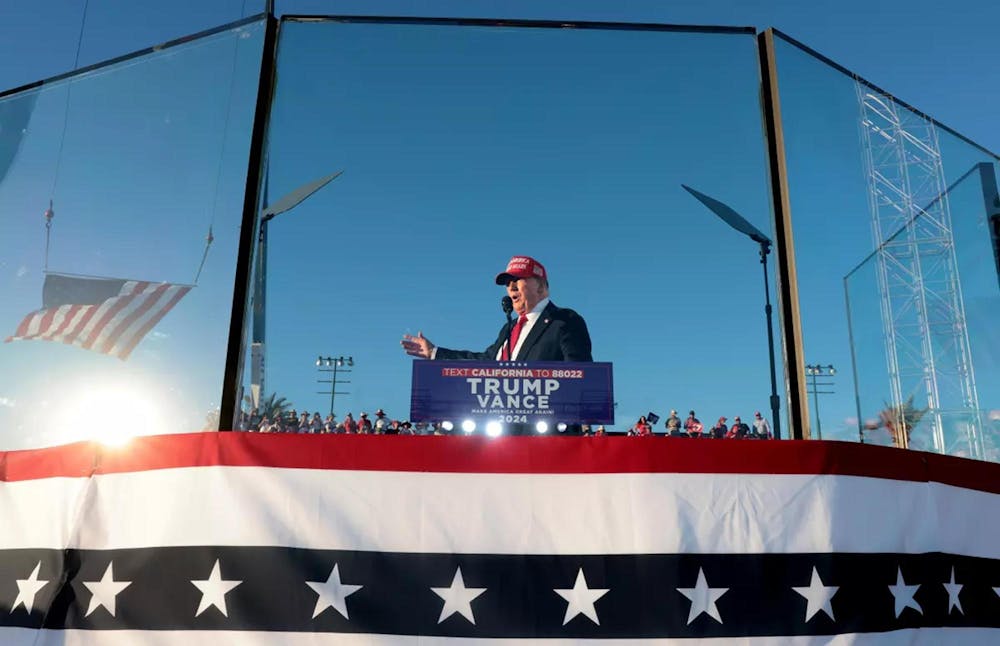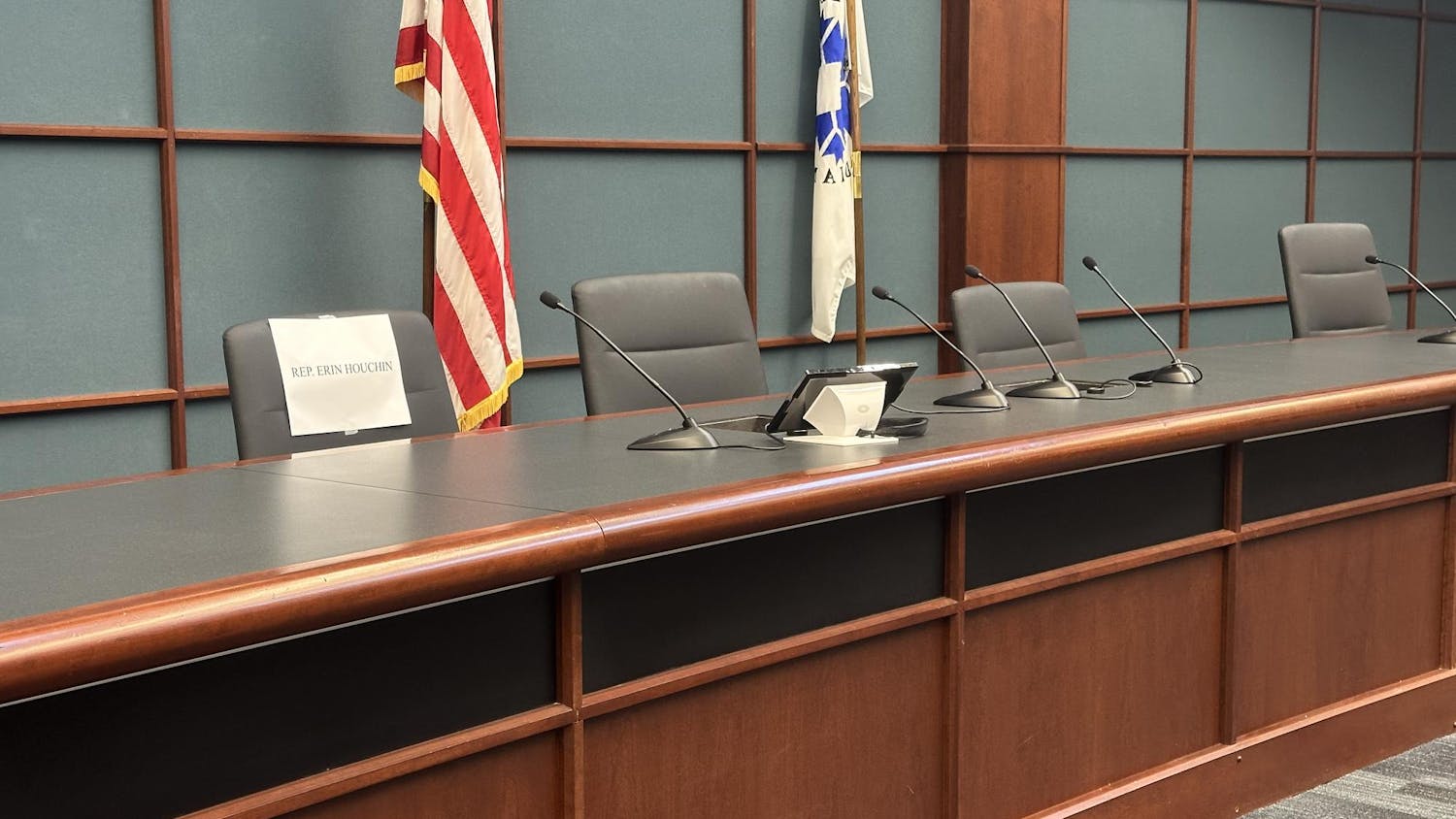Editor’s note: The opinions reflected by each professor in this article reflect the views of the individual writer and not necessarily those of the IDS or its staffers. The emails were edited for style only.
President Donald Trump painted a dark portrait of the United States in his inaugural address Monday, a picture that resulted from a “decline” he said he would reverse.
The transition from Joe Biden’s administration to Trump’s can only be known as the country experiences it day by day. Still, political scientists trying to predict what the next four years could look like have the advantage of analyzing his first term.
The Indiana Daily Student emailed every faculty member in IU’s Department of Political Science. Here’s what they responded to one question: What predictions do you have for Donald Trump’s second term as president?
Michael Weinman, Senior Lecturer of Political Science and Jewish Studies:
While I think any positive predictions are a fool’s errand in politics, one can sometimes succeed in saying something that “ages well” in predicting what won’t happen. In that light, I am willing to venture to list a few things that won’t happen over the second Trump administration, in order of greatest to least confidence.
With great confidence, I would say that we will not see any of the following outcomes that have been sometimes predicted by those who are most troubled by Trump’s reelection: the end of American democracy; the abandonment of the separation of powers, for instance through a systemic override of the Senate’s “advise and consent” role in cabinet-level presidential appointments; the failure to carry out free and fair elections in the 2026 midterms; the persecution (or for that matter, prosecution) of “the President’s enemies” such as Liz Cheney, Jack Smith, or Merrick Garland (NOTE: President Joe Biden issued a preemptive pardon for Liz Cheney, among others, on Monday. He did not pardon Jack Smith or Merrick Garland) among others for their “weaponization” of the powers of congressional oversight and Justice Department investigations. With the same degree of confidence, I think we can safely predict that, as Trump himself has taken to admitting, we will not see inflation reduced drastically and “easily” in the coming 18 months at least.
With moderate confidence, I would say that we will also not see many of the other central promises of the Trump-Vance campaign come to pass. That is, we will not see a wall (beautiful or otherwise) built all along the U.S.-Mexico border; we will not see the mass deportation of undocumented migrants, measured in multiples of millions, let alone the 10+ million, sometimes 15 million figure often mentioned in campaign events. (That said, to be clear, according to a December 2024 ICE report, President Biden’s administration “removed 271,484 noncitizens with final orders of removal to 192 different countries” in 2024 alone and there is no reason to think the number will be lower during Trump’s Presidency.)
With somewhat lower (but still a fair degree of) confidence, but with no joy at all, I would finally say that we will not see either the degree of persistent and dogged opposition (or “resistance”) to this Trump Administration along the lines his first Presidency faced leading into the 2018 midterm elections. And, for the same reasons, I would say that we will not see the sort of “blue wave” midterm in 2026 that we saw in 2018, where Democrats gained a whopping 41 seats in the House of Representatives and nearly balanced the split of Governor’s offices (27 R/23 D after the 2018 elections; 33 R/16 D/1 I before the elections).
Bill Scheuerman, professor of international studies and political science:
I have no crystal ball. However, based on Trump's extreme far-right political campaign, and the fact that his cabinet members now look to be extreme ideologues and/or selfish billionaires, it seems pretty clear what we should expect: a presidency that feeds xenophobia to working people to distract them from its frontal attack on government programs that rein in the super-rich and (occasionally) keep them from sticking it to the rest of us. In other words, the most pro-billionaire presidency in history, wrapped up in "populist" rhetoric that demonizes immigrants and other easy targets — for example, trans teenagers or, for that matter, "woke" college professors. Trump's ongoing love-in fest with Elon Musk, a billionaire and ally of neo-fascists around the world, encapsulates that dangerous political mix perfectly.
Back in 2016, I still hoped that responsible conservatives would check Trump's extremism. Those voices have since been driven out of the GOP, which is presently little more than a Trump cult. (Unfortunately, Indiana's GOP — including our two U.S. Senators — are among the cult's charter members. What an embarrassment.) (Note: Sen. Todd Young said in March he wouldn’t endorse Trump’s candidacy in the primaries. He congratulated Trump on Monday).
In the next few years, our democracy will face existential threats. I am not sure it will survive intact, at least if the rest of us sit on our rears and let Trump and Musk get away with doing whatever they want. I do hope that people who thought they were voting for Trump because he promised to reduce inflation figure out that it was just his latest con. Whatever you might say about Trump, one thing is certain: he is America's greatest con artist ever.
Jeffrey Isaac, political science professor:
I predict that Trump will continue the assault on constitutional democracy that he has pursued ever since 2016. He will continue to red-bait all who criticize him, and under Attorney General-designee Pam Bondi and FBI Director-designee Kash Patel, his Justice Department will harass opponents, give a free rein to police brutality, and stop enforcing civil rights and civil liberties law. His homeland security team will vigorously pursue the detention and deportation of millions of undocumented immigrants. His Department of Education will crack down hard on academic freedom. And his Energy Department will unleash the petroleum industry in defiance of concerns about global warming. The rich will get richer, the Trump family will get much richer, and the poor will get poorer. These things are certain, and all of them will be accomplished via executive action. Trump will not get everything he wants. There will be chaos in his administration, there will be political opposition, and some of his measures will be limited or overturned by courts — a process that can take years, during which much damage can be done. The next four years are going to be a very dark time for democracy.
Dina Spechler, associate professor of political science:
I'm always reluctant to make predictions, especially at the start of a new presidential term, and Donald Trump is harder to predict than most. The key question is, will he do everything he has threatened or promised to do? In part, that depends on the reactions or pushback he receives from other governments. But it also depends on just how committed Mr. Trump is to follow through on everything he has recently said he will do. If he does everything he has announced, he will force Ukraine and Russia to reach a settlement of some sort; he will deport millions of undocumented immigrants; he will either annex Canada or impose on it a very high set of tariffs; and he will occupy Greenland and seize the Panama Canal. He will also intensify economic sanctions on Iran, impose up to 80% tariffs on all goods imported from China (NOTE: Trump has proposed tariffs “60% or higher” on Chinese goods) and raise tariffs substantially on goods from Mexico and some goods from the EU. Reviving threats he made during his previous term, he will withdraw the U.S. from NATO. He will also withdraw from the Paris Climate Accords.
However, I don't actually expect him to do all of these things. He will probably reach a trade agreement with Canada and leave its sovereignty intact. Likewise, he will probably reach some sort of accord with Greenland and Panama and focus on pressuring our NATO allies to contribute more to their collective defense.
I also expect a substantial push to reach an agreement with Saudi Arabia that will lead to major new U.S. security commitments and assistance in constructing a nuclear reactor in return for recognition of the state of Israel. If Hamas violates the terms of the ceasefire, he will support renewed Israeli hostilities in Gaza.
CORRECTION: This story has been updated to reflect the correct spelling of Jeffrey Isaac's name.




